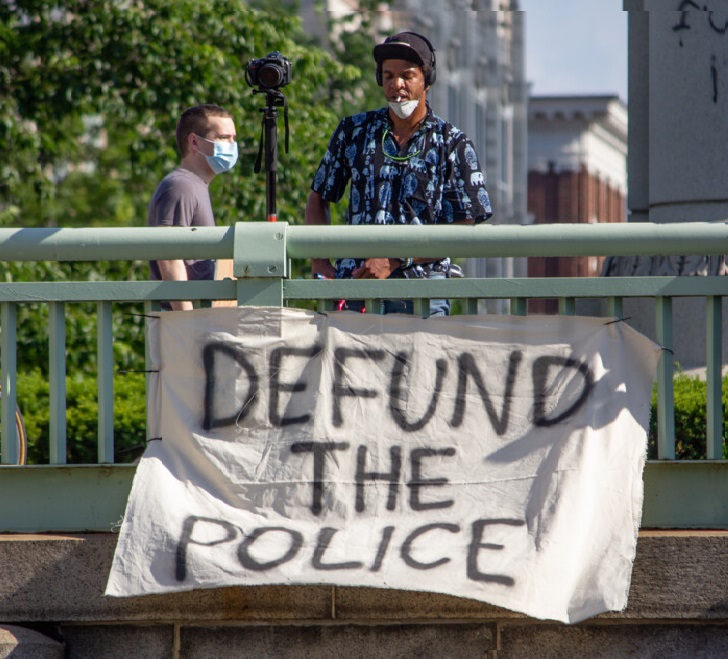
Defund the police Carl Roose / AFSC
My first recognizable reflection on policing came after moving into a changing neighborhood in Philadelphia as a young adult in the 1970s. Our largely white community was open-hearted but nervous, living in the midst of more trauma than most of us had grown up with. One person offered a striking perspective on the police and ambulance sirens that we heard so often in our neighborhood: Don’t think of it as something terrible that has happened; think of it as help on the way.
"I made my home in the city, got to know people and read the news, it became abundantly clear that the police were not always benign community helpers."
This advice put a comforting spin on a worrisome phenomenon, but as I made my home in the city, got to know people and read the news, it became abundantly clear that the police were not always benign community helpers. I saw how individual officers could cause grievous damage, especially when in leadership roles, as I witnessed innocent teens getting rounded up for being Black, and a young man being arrested in the midst of an epileptic attack. I acquired an understanding in my bones of why Black people did not see the police as their friends.
But it wasn’t until the shooting of Michael Brown in Ferguson, Missouri that I had my first inkling of how the whole system of policing could be unjust. A friend who went out to Ferguson to accompany local activists told me about how the police department there was funded by money from traffic fines, how 85% of stops were of Black people even though they made up only two thirds of the population, and how they faced jail when they were unable to pay fines. I was shocked to the core. Something had to be done about the racist, unjust, immoral policies in towns such as this.
After the murder of George Floyd, as talk of defunding the police began to gain traction, I still took it as the voice of legitimate outrage—rather than a policy proposal to actually pursue. Then I heard a talk by a longtime activist from Minneapolis, Ricardo Levins Morales, who had spent much of the past decade in a community effort to uncover the history and reimagine the future of the Minneapolis police department.
Reading their report, MPD150, was a revelation. I’d never considered the history of policing. I learned that the first police department in Britain in the early 1800s was modeled on the Royal Irish Constabulary, designed to maintain control in rebellious occupied Ireland. In the American colonies, many of the first policing efforts were similarly established to deal with rebellious enslaved people. The police went on to be used to quell strikes and labor unrest.
The initial intent behind policing was never to promote common safety. It was to exercise control over those who had reason to be dissatisfied with the status quo, and to protect the property rights and safety of those who held power.
Given such a history, it’s not surprising that internal reforms among police departments have never had much impact. The Minneapolis report details decades of reform attempts—training, transparency, accountability, civilian review—that have failed to change the blunt-force trajectory of the police department. They conclude that the department itself must be dismantled and something radically new built in its place.
This doesn’t mean that all police are bad, or that police departments don’t perform useful and important work. The system just needs to be totally rethought.
Consider this question from the report: Imagine that you were asked to help create stability in a newly-founded city. How would you try to solve the problems that your friends and neighbors encountered? How would you respond to crisis and violence? Would your *first* choice be an unaccountable army with a history of oppression and violence patrolling your neighborhood around the clock?
"We could begin building up our own neighborhood capacity to watch out for each other, and our own abilities in community conflict resolution."
While pulling the entire budget out of a police department seems drastic, it’s not hard to imagine pulling jobs out of their portfolio and reassigning those jobs—along with their funding—somewhere else. That includes responding to mental health crises or domestic disputes, engaging with the houseless, and making traffic stops. We could also move immediately to stop the U.S. military from transferring their excess weapons and supplies to state and local police departments. At the same time, we could begin building up our own neighborhood capacity to watch out for each other, and our own abilities in community conflict resolution.
While I wish I had come to this understanding sooner, I’m happy to have arrived at the point where the concept of defunding the police no longer seems outrageous or threatening. It now seems like a clear and compelling framework for looking hard at where we have come from and thinking boldly and freshly about who needs protection from what, and how best to ensure safety for each other.
